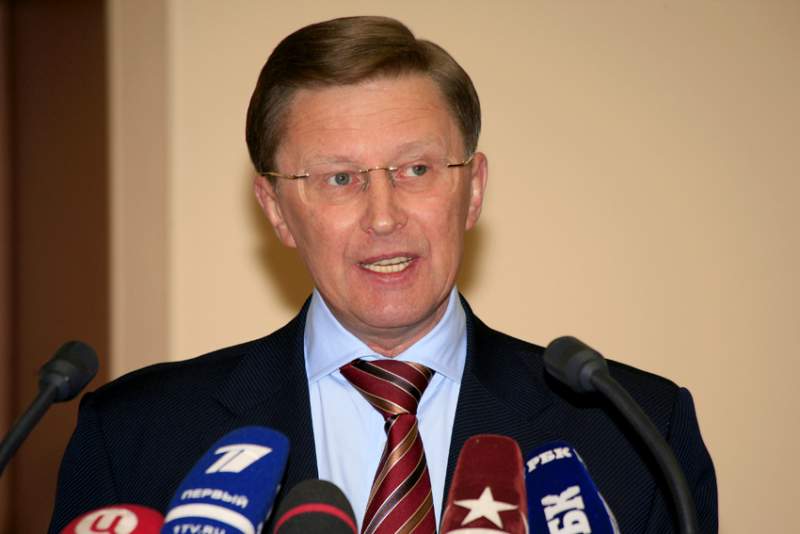
Medvedev’s Proposal for a Special Northern Caucasus Envoy Sparks Wide Speculation
Publication: Eurasia Daily Monitor Volume: 6 Issue: 229
By:

On December 10, Nezavisimaya Gazeta reported that Deputy Prime Minister Sergei Ivanov might be appointed special representative responsible for the North Caucasus republics. This news raised speculation about possible candidacies for this position to a new level, as the appointment of a high-ranking official like Sergei Ivanov would mean Moscow is planning to focus considerable efforts on the region.
In his state of the nation address on November 12, President Dmitry Medvedev called the situation in the North Caucasus “the greatest internal political issue” of the Russian Federation. One of the measures he proposed was to assign the task of pacifying and normalizing the region to a special federal representative who would utilize significant resources and power to achieve stability in the North Caucasus. Medvedev vowed to continue to crackdown on the insurgency in the region, but also insisted that stability cannot be achieved without improving the economy and general life conditions in the republics of the North Caucasus. Along with the appointment of a special envoy for the region, Medvedev entrusted the government with the task of working out clear criteria for federal agencies’ effectiveness in the region before January 1, 2010 (www.kremlin.ru, November 12).
According to a source close to the Kremlin, various possibilities are being explored for such a special North Caucasus representative, such as endowing him with the status of deputy prime minister or special presidential envoy. The same source reported that Medvedev and Prime Minister Vladimir Putin had not agreed on the candidate for the position (Nezavisimaya Gazeta, December 10).
Meanwhile, several possible nominees for the North Caucasus special envoy position captured public attention before Sergei Ivanov. Mikhail Gutseriev, a wealthy Russian businessman of Ingush origin who fell out with powerful Kremlin circles and left Russia was speedily removed from the international arrest warrant list by the Russian authorities in October (Kommersant, October 28). This move, unusual for the current Russian authorities, was immediately interpreted by a number of analysts as preparing Gutseriev’s possible return either to Ingushetia to help Moscow pacify this troubled region or even to assume the position of Moscow’s North Caucasus envoy.
Chechen President Ramzan Kadyrov became another figure widely assumed to be a strong contender for this position. This speculation was fueled by the fact that soon after President Medvedev made his announcement, Kadyrov received the rank of police major-general. Russia’s minister for regional development, Dmitry Kozak, and Deputy Interior Minister Arkady Yedelev are also considered to be among the possible candidates for North Caucasus envoy. A Moscow billionaire of Dagestani (Lezgin) origin, Suleiman Kerimov, is yet another, though less likely contender for the position (Nezavisimaya Gazeta, December 10).
The urgency of quelling the insurgency in the North Caucasus increased even further after Medvedev’s recent address as the issue has advanced to the top of the political agenda in Russia after the elite Nevsky Express train, connecting Moscow and St. Petersburg, was derailed by an explosion on November 27. According to official sources, 26 people died in the train crash, while the insurgency claimed over 30 casualties among the passengers. Russian officials and media quickly put the blame for the attack on rebels from the North Caucasus. Unlike the numerous incidents in the North Caucasus that do not disturb the general Russian public because of the remoteness of the region, the derailment struck Russia right in the middle of the country. In addition, several top Russian officials –the heads of the highway and commodity reserve agencies– were killed in the derailment.
For Deputy Prime Minister Sergei Ivanov, formerly considered for succeeding Vladimir Putin as president of Russia, his possible appointment as a special presidential envoy in the Northern Caucasus would be a “downshifting,” said liberal analyst Dmitry Oreshkin. “We see that the [North] Caucasus is perceived [by the Russian government] as a problem of increasing importance and growing urgency and this is the most unpleasant thing about it,” said Oreshkin (Ekho Moskvy, December 10).
Russian analysts disagree on the plenipotentiary power that the envoy would have. Some say the new person will not resemble the governors of the Russian empire period, meaning he will not be able to dismiss local presidents or have a completely free hand in handling federal money. Others argue that a Russian military official will be appointed to this position and he will enjoy full control over the money flows as well as the ability to appoint and dismiss local bureaucrats (www.kavkaz-uzel.ru, December 10).
Appointing a Moscow envoy for the North Caucasus may be meant to have not only a local impact, but also another, more far reaching national impact. If the information about Medvedev and Putin having differences on the personality of the envoy is true, it may indicate that the two men regard this position as an important tool for their political strategies. Indeed, for President Medvedev, appointing his own loyalist with great plenipotentiary powers in the North Caucasus would be a convenient and relatively innocent way of gaining a foothold in the Russian security services, which have had a disproportionally strong presence in the region for the past two decades.
While Putin is known for his grip over the siloviki, which in Russia essentially translates into political power, Medvedev has yet to demonstrate that he can find the right approach to acquire more influence within this specific circle. Appointing a super powerful person in a region where the Russian security services have worked so intensely could present President Medvedev with opportunities he could not miss. The results of the envoy’s mission will be of less importance than his ability to effectively utilize the given resources and power. Conversely, the appointment of the envoy will be indicative of whether the balance of power within Russia’s ruling tandem is shifting or, on the contrary, it is becoming more stable.




